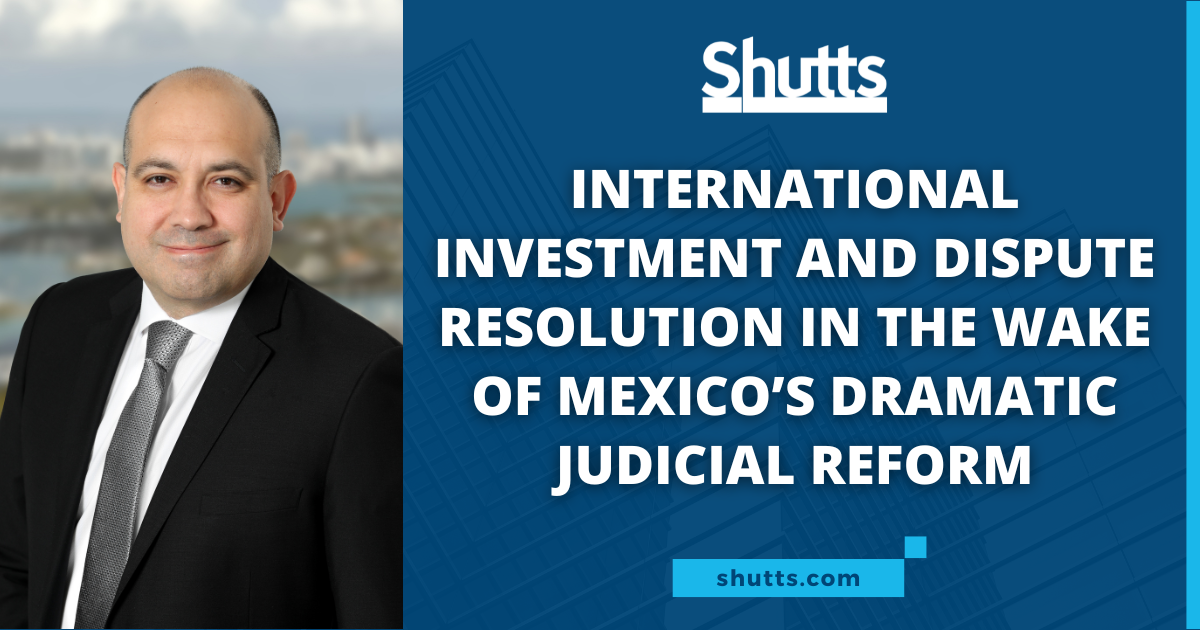
This article appeared in the Daily Business Review on November 11, 2024.
Commentary provided by Eduardo J. De la Peña Bernal.
Mexico’s legal landscape is in the midst of a critical transformation resulting from a dramatic constitutional reform that will cause the complete overhaul of its entire federal judiciary by judges elected in general elections. The effects of this reform at this point are difficult to fully comprehend. They could be far reaching on a macro level, impacting not only the country itself but also its trading partners. What is certain, though, is that while the dust settles, companies or individuals doing business in and out of Mexico are paying attention and will seek ways to structure their investments and adjudicate the disputes emanating from them favoring alternative mechanisms such as arbitration.
The Backdrop, Salient Elements and Status of Mexico’s Judicial Reform
Culminating years of back-and-forth contentious discussions between the administration of former President Andres Manuel Lopez Obrador and Mexico’s federal judiciary, on Sept. 15, 2024, a constitutional amendment was signed into law and published at the Official Gazette to entirely transform the election process and composition of Mexico’s federal judiciary, at all levels (the Judicial Reform).
The Judicial Reform, which was supported by two-thirds of both Mexico’s House of Representatives and Senate, and a majority of state legislatures, implies the gradual removal during the next three years of the existing 1,600-plus appointed members of the Mexican federal judiciary. It also calls for the election by popular vote, first in June 2025 and thereafter in 2027, of each of Mexico’s Supreme Court justices, appellate court judges, district court judges and electoral court judges.
Candidates must be Mexican nationals by birth, with a law degree obtained with an overall GPA of 8/10, with at least five years of relevant legal experience, having resided the prior two years in Mexico, and go through an evaluation process by committees specially appointed separately by each one of the branches of government: the Executive, Legislative and Judiciary. Ultimately, the president, the Congress (with a vote of two-thirds of present members in session), and the Supreme Court will each and separately, without consulting the other, propose the nomination of their desired candidates who will be subject to election by popular vote for each vacant position.
The Judicial Reform is now the law of the land having prevailed as recently as Nov. 6, 2024, in a challenge to its constitutionality before the currently presiding Supreme Court (eight votes were required to declare the unconstitutionality of the Judicial Reform, but only seven of the eleven current Supreme Court justices considered the challenges valid).
The Time for International Arbitration as an Alternative to Mexico’s Judicial Reform
The process of implementation of the Judicial Reform is underway, but has just started. As probably expected, until the members of the new elected judiciary are known, questions as to their independence and professional expertise will not cease, creating a climate of legal and business uncertainty.
This uncertainty will not be sustainable considering the size of the Mexican economy and the influx of foreign investment committed to it for the long run.
Mexico’s market is comprised of 120 million people. It is member of the OECD, the 12th largest economy of the world by GDP standards, the second largest economy of Latin America, and the second largest trading partner of the United States. Mexico has also been one of the prime beneficiaries of the nearshoring phenomenon. Just last year, in 2023, Mexico’s foreign direct investment rose to $36 billion USD, the highest total on record for a single year.
With this backdrop, it is quite likely we will, or should, start to see in the short-term certain measures or actions from Mexican and foreign investors doing business in or out of Mexico, particularly in industries sensitive to government regulation, that will try to move their disputes away from the court system and into specialized international arbitral tribunals.
One way to accomplish this will be in certain instances by restructuring investments made or to be made to incorporate corporate vehicles that will permit investors to benefit from the protections afforded by the large number of bilateral (more than 30) and multilateral treaties (including with the United States, Canada, Central America, Mercosur, Europe and the Asia-Pacific region) that Mexico has entered to protect foreign investments hosted in the country. All those legal instruments incorporate the option of arbitration at international fora to resolve investor-state disputes.
Another avenue that may allow parties to avoid the local court system during this transitional period of uncertainty will be to incorporate or add arbitration provisions into future or existing commercial agreements providing for arbitration seated in jurisdictions like Miami, Florida (which possess a strong pro-arbitration enforcement legal system and a community very culturally attune with Latin America), in lieu of judicial adjudication or even arbitration with a Mexican seat. This will aid to not only have the merits of a dispute resolved in arbitration, but also the judicial control of any potential dispute adjudicated outside of Mexico.
One way or the other, international arbitration disputes arising from Mexico will be coming to town.
Eduardo J. De la Peña Bernal is a partner in the Miami office of Shutts & Bowen, where he is a member of the international litigation and arbitration practice group.
